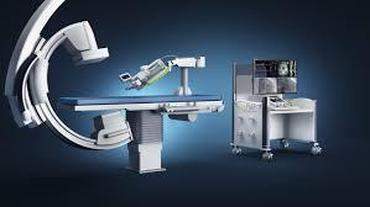A doctor in India has performed a series of five percutaneous coronary intervention (PCI) procedures on patients who were 20 miles away from him. The feat was pulled off using a precision vascular robot developed by Corindus. The results of the surgeries, which were successful, have just been published in EClinicalMedicine, a spin-off of medical journal The Lancet.
The feat is an example of telemedicine, an emerging field that leverages advances in networking, robotics, mixed reality, and communications technologies to beam in medical experts to remote locations for everything from consultations to surgical procedures. Telemedicine, which could decentralize healthcare by distributing doctors into local communities virtually, could ease shortages of nurses and doctors and potentially cut healthcare costs. In France, people are already visiting Telehealth cabins for fast, convenient healthcare. During the recent Ebola crisis, the University of Virginia delivered care in parts of Africa via telemedicine.
Surgery is considered the final frontier of the still-young field. Robots are now commonly used in surgical procedures around the world, but always under the vigilant eye of a surgeon in the operating room. Theoretically, some surgical procedures currently performed with robots could be done remotely without significantly changing the procedure.
But distance introduces challenges, including connectivity and latency issues. A network crash mid-procedure could be catastrophic.
All of which makes the feat pulled off last year by Dr. Tejas Patel, Chairman and Chief Interventional Cardiologist of the Apex Heart Institute in Ahmedabad, Gujarat, India, the more impressive.
“I am honored to have been a part of this medical milestone,” stated Dr. Patel. “The application of telerobotics for remote treatment has the potential to impact a significant number of lives by providing access to specialized care that may not otherwise be possible. I am pleased to share my experience with the clinical community in such a well-respected publication that is part of the Lancet family,” added Dr. Patel.
During the remote procedures, Dr. Patel used Corindus’ CorPath GRX robot and a hardwired internet connection, manipulating the robot with a set of joysticks and a video monitor. Corindus has performed several remote test cases in the U.S. since, but Dr. Patel’s procedure marked a major milestone in medicine.
“Remote procedures have the potential to transform how we deliver care when treating the most time-sensitive illnesses such as heart attack and stroke,” says Mark Toland, President and Chief Executive Officer of Corindus Vascular Robotics. “The success of this study paves the way for large-scale, long-distance telerobotic platforms across the globe, and its publication in Lancet’s EClinicalMedicine demonstrates the transformative nature of telerobotics. While remote robotic procedures are still in the early stages of development, it is clear we are on track to expand patients’ access to care, while reducing their time to treatment.”
See full article: First Long-Distance Heart Surgery Performed via Robot
Written by: Greg Nichols
 A Specialty Recruiting Firm Exclusively Servicing The Medical Device Industry
A Specialty Recruiting Firm Exclusively Servicing The Medical Device IndustryLegacy MedSearch has more than 30 years of combined experience recruiting in the medical device industry. We pride ourselves on our professionalism and ability to communicate quickly and honestly with all parties in the hiring process. Our clients include both blue-chip companies and innovative startups within the MedTech space. Over the past 10 years, we have built one of the strongest networks of device professionals ranging from sales, marketing, research & , quality & regulatory, project management, field service, and clinical affairs.
We offer a variety of different solutions for hiring managers depending on the scope and scale of each individual search. We craft a personalized solution for each client and position with a focus on attracting the best possible talent in the shortest possible time frame.
Are you hiring?
Contact us to discuss partnering with Legacy MedSearch on your position.
